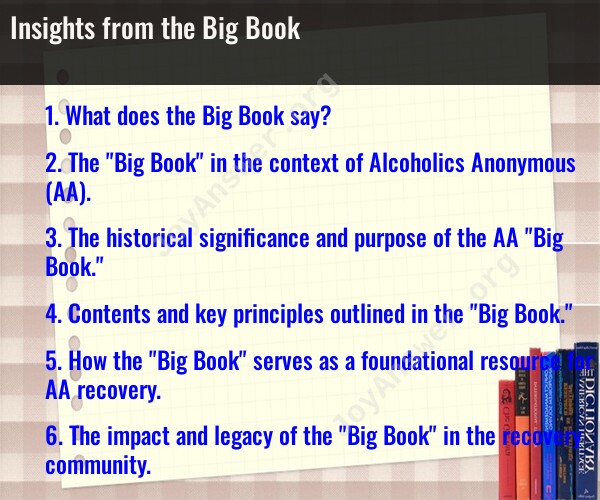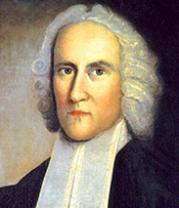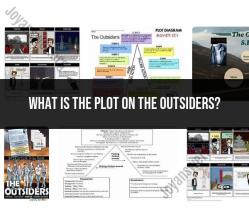What does the Big Book say?
The "Big Book" of Alcoholics Anonymous (AA) is a comprehensive text that provides insights, guidance, and a structured program for individuals seeking recovery from alcoholism. It offers a profound understanding of alcoholism and the path to sobriety. Here are some key insights and principles from the "Big Book":
Understanding Alcoholism:
- The "Big Book" defines alcoholism as a chronic and progressive disease, characterized by an inability to control one's drinking, a physical allergy to alcohol, and a mental obsession with drinking.
Spiritual Awakening:
- The book emphasizes the importance of a spiritual awakening as a fundamental aspect of recovery. It encourages individuals to find a higher power or spiritual solution to help them overcome their addiction.
Powerlessness and Unmanageability:
- It acknowledges that alcoholics are powerless over alcohol and that their lives have become unmanageable as a result of their drinking.
The 12 Steps:
- The "Big Book" outlines the 12 Steps of AA, which are a set of principles and actions that individuals are encouraged to follow as a path to recovery. These steps include self-reflection, making amends, and helping others.
Fellowship and Support:
- The book stresses the importance of fellowship and the support of other recovering alcoholics. It encourages individuals to attend AA meetings, where they can share their experiences, strengths, and hope with others.
Personal Stories:
- The "Big Book" includes personal stories of individuals who have achieved and maintained sobriety through AA. These stories provide inspiration and show that recovery is possible.
Honesty and Self-Examination:
- It emphasizes the need for honesty and thorough self-examination to identify character defects and past wrongs. This is a key component of the Fourth and Fifth Steps.
Making Amends:
- The book discusses making amends to those harmed by one's drinking, provided it does not harm them or others. This process is a part of the Ninth Step.
Service and Helping Others:
- AA encourages individuals to engage in service and to help other alcoholics as a way to maintain sobriety and contribute to the fellowship.
One Day at a Time:
- The "Big Book" teaches the concept of taking sobriety one day at a time. It advises individuals to focus on staying sober in the present rather than worrying about the future.
Spiritual Experience:
- The book suggests that a spiritual experience can come in various forms, not necessarily a dramatic, religious conversion. It may be a gradual change in perception and attitude.
Recovery Is Possible:
- Throughout the "Big Book," there is a message of hope and the belief that recovery from alcoholism is possible through commitment to the AA program and the support of fellow members.
These insights and principles from the "Big Book" form the foundation of the Alcoholics Anonymous program and have been instrumental in helping millions of individuals achieve and maintain sobriety. It offers a structured approach to recovery and provides a community of support for those seeking to overcome alcohol addiction.
The "Big Book" in the context of Alcoholics Anonymous (AA)
The "Big Book", also known as Alcoholics Anonymous: The Story of How More Than One Hundred Men Have Recovered from Alcoholism, is the foundational text of Alcoholics Anonymous (AA). It was first published in 1939 and has since sold over 40 million copies worldwide. The book is a compilation of personal stories from early AA members, as well as a guide to the AA program.
The historical significance and purpose of the AA "Big Book"
The "Big Book" was written by Bill W., one of the co-founders of AA, and several other early AA members. The book was intended to serve two purposes:
- To share the experiences of early AA members and show other alcoholics that recovery is possible.
- To provide a guide to the AA program, including the 12 Steps and the 12 Traditions.
The "Big Book" has played a significant role in the development and success of AA. It is a book that has helped millions of alcoholics achieve sobriety and live happy and fulfilling lives.
Contents and key principles outlined in the "Big Book"
The "Big Book" is divided into four parts:
- Part One: Bill W.'s story and the early history of AA
- Part Two: The 12 Steps of AA
- Part Three: The 12 Traditions of AA
- Part Four: Personal stories from early AA members
The key principles outlined in the "Big Book" include:
- Alcoholism is a disease, not a moral failing.
- Recovery is possible through the 12 Steps of AA.
- AA is a fellowship of alcoholics who help each other recover.
- AA is based on spiritual principles, but it is not a religious organization.
How the "Big Book" serves as a foundational resource for AA recovery
The "Big Book" serves as a foundational resource for AA recovery in a number of ways. It provides:
- A comprehensive overview of the AA program, including the 12 Steps and the 12 Traditions.
- Personal stories from early AA members that provide inspiration and hope to other alcoholics who are struggling to achieve sobriety.
- Guidance on how to work the 12 Steps and live the AA way of life.
The "Big Book" is a valuable resource for all AA members, regardless of how long they have been sober. It is a book that can be read and reread over time, and it always offers new insights and wisdom.
The impact and legacy of the "Big Book" in the recovery community
The "Big Book" has had a profound impact on the recovery community. It is the most widely read and influential book on alcoholism recovery in the world.
The "Big Book" has helped millions of alcoholics achieve sobriety and live happy and fulfilling lives. It has also inspired the development of other addiction recovery programs, such as Narcotics Anonymous and Cocaine Anonymous.
The "Big Book" is a timeless classic that continues to be relevant today. It is a book that offers hope and inspiration to anyone who is struggling with addiction.
In addition to the above, here are some other notable impacts and legacies of the "Big Book":
- The "Big Book" has been translated into over 70 languages and is used by AA groups all over the world.
- The "Big Book" has been adapted into other formats, such as audiobooks, e-books, and Braille versions.
- The "Big Book" has been the subject of numerous scholarly studies and articles.
- The "Big Book" has been cited in legal decisions and government reports.
The "Big Book" is a truly remarkable book that has had a profound impact on the world. It is a book that continues to inspire and support millions of people in recovery today.













